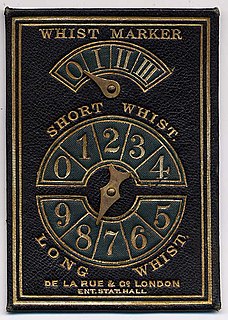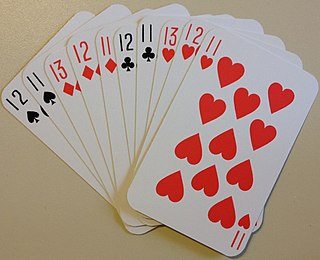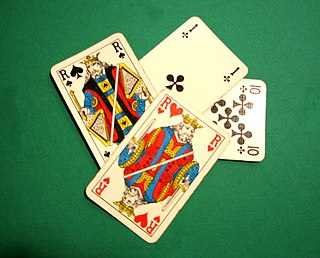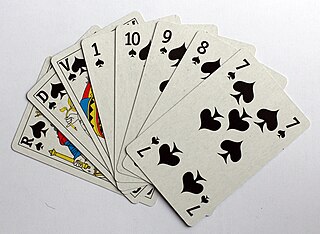
Whist is a classic English trick-taking card game which was widely played in the 18th and 19th centuries. Although the rules are simple, there is scope for scientific play.

500 or five hundred, also called bid Euchre is a trick-taking game that is an extension of euchre with some ideas from bridge. For two to six players, it is most commonly played by four players in partnerships, but is sometimes recommended as a good three-player game. It arose in America before 1900 and was promoted by the United States Playing Card Company, which copyrighted and marketed the rules in 1904. 500 is a social card game and was highly popular in the United States until around 1920 when first auction bridge and then contract bridge drove it from favour. 500 continues to enjoy popularity in Ohio and Pennsylvania, where it has been taught through six generations community-wide, and in other countries: Australia, New Zealand, Canada (Quebec) and Shetland. The originator of Five Hundred, US Playing Card Company of Cincinnati, Ohio, now has headquarters across the Ohio River in Erlanger, Kentucky. Five hundred is promoted by some as the national card game of Australia.

Euchre or eucre is a trick-taking card game commonly played in Australia, Canada, New Zealand, Great Britain, and the United States. It is played with a deck of 24, 28, or 32 standard playing cards. Normally there are four players, two on each team, although there are variations that range from two to nine players.

Spades is a trick-taking card game devised in the United States in the 1930s. It can be played as either a partnership or solo/"cutthroat" game. The object is to take the number of tricks that were bid before play of the hand began. Spades is a descendant of the Whist family of card games, which also includes Bridge, Hearts, and Oh Hell. Its major difference as compared to other Whist variants is that, instead of trump being decided by the highest bidder or at random, the Spade suit always trumps, hence the name.
Ninety-nine is a card game for 2, 3, or 4 players. It is a trick-taking game that can use ordinary French-suited cards. Ninety-nine was created in 1967 by David Parlett; his goal was to have a good 3-player trick-taking game with simple rules yet great room for strategy.

Forty-fives is a trick-taking card game that originated in Ireland. The game is popular in many communities throughout Atlantic Canada as well as the Gaspé Coast in Québec. Forty-fives is also played in parts of Massachusetts and southern New Hampshire in New England, United States, as well as in the South Island of New Zealand.

Tarabish, also known by its slang term Bish, is a Canadian trick-taking card game of complex rules derived from Belote, a game of the Jass family. The name is pronounced "tar-bish", despite the spelling. It is played primarily by the people of Cape Breton, Nova Scotia, in Canada, where it was brought in 1901 by a Lebanese immigrant George Shebib.
Belote is a 32-card, trick-taking, Ace-Ten game played primarily in France and certain European countries, namely Armenia, Bulgaria, Croatia, Cyprus, Greece, Luxembourg, Moldova, North Macedonia and also in Saudi Arabia. It is one of the most popular card games in those countries, and the national card game of France, both casually and in gambling. It was invented around 1920 in France, and is a close relative of both Klaberjass and Klaverjas. Closely related games are played throughout the world. Definitive rules of the game were first published in 1921.
Pedreaux is an American trick-taking card game of the All Fours family based on Auction Pitch. Its most popular variant is known as Cinch, Double Pedro or High Five. Developed in Denver, Colorado, in the 1880s, it was soon regarded as the most important member of the All Fours family. Although it went out of fashion with the rise of Auction Bridge, it is still widely played on the western coast of the United States and in its southern states, being the dominant game in some locations in Louisiana. Forms of the game have been reported from Nicaragua, the Azores, Italy and Finland. The game is primarily played by four players in fixed partnerships, but can also be played by 2–6 individual players.

Bid whist is a partnership trick-taking variant of the classic card game whist. As indicated by the name, bid whist adds a bidding element to the game that is not present in classic whist. Bid whist, along with spades, remains popular particularly in U.S. military culture and a tradition in African-American culture.
Pitch is an American trick-taking card game derived from the English game of All Fours. Historically, Pitch started as "Blind All Fours", a very simple All Fours variant that is still played in England as a pub game. The modern game involving a bidding phase and setting back a party's score if the bid is not reached came up in the middle of the 19th century and is more precisely known as Auction Pitch or Setback. Whereas All Fours started as a two-player game, Pitch is most popular for three to five players. Four can play individually or in fixed partnerships, depending in part on regional preferences. Auction Pitch is played in numerous variations that vary the deck used, provide methods for improving players hands, or expand the scoring system. Some of these variants gave rise to a new game known as Pedro or Cinch.

Daifugō or Daihinmin, also known as Tycoon, is a Japanese shedding-type card game for three or more players played with a standard 52-card pack. The objective of the game is to get rid of all the cards one has as fast as possible by playing progressively stronger cards than those of the previous player. The winner is called the daifugō earning various advantages in the next round, and the last person is called the daihinmin. In that following round, winners can exchange their one or more unnecessary cards for advantageous ones that losers have.
3-5-8, also known as Sergeant Major for its popularity among members of the Royal Air Force, is a trick-taking card game for 3 players, using a standard 52 card deck. 3-5-8 may be played as a gambling game, and there are many variations with names like "8-5-3" and "9-5-2" played throughout the world. The version "9-5-3 variation with no kitty" was played in the Royal Navy over fifty years ago, when crew would play games across several nights.
Smear is a North-American trick-taking card game of the All Fours group, and a variant of Pitch (Setback). Several slightly different versions are played in the Upper Peninsula of Michigan, Minnesota, Northern and Central Iowa, Wisconsin and also in Ontario, Canada.

Euchre has many variations in game playing. Some of them are designed for two, three, five or more players. Below is an incomplete list of major notable variations of the game.
Clag or Clagg is a trick-taking card game using a standard deck of 52 playing cards. It is similar to Whist or Oh Hell, and can be played with up to seven players.
Court Piece is an Iranian trick-taking card game similar to the card game whist in which eldest hand makes trumps after the first five cards have been dealt, and trick-play is typically stopped after one party has won seven tricks. A bonus is awarded if one party wins the first seven tricks, or even all tricks. The game is played by four players in two teams, but there are also adaptations for two or three players.

Triomphe, once known as French Ruff, is a card game dating from the late 15th century. It most likely originated in France or Spain and later spread to the rest of Europe. When the game arrived in Italy, it shared a similar name with the pre-existing game and deck known as trionfi; probably resulting in the latter becoming renamed as Tarocchi (tarot). While trionfi has a fifth suit that acts as permanent trumps, triomphe randomly selects one of the existing four suits as trumps. Another common feature of this game is the robbing of the stock. Triomphe became so popular that during the 16th century the earlier game of trionfi was gradually renamed tarocchi, tarot, or tarock. This game is the origin of the English word "trump" and is the ancestor of many trick-taking games like Euchre and Whist.

Dreierschnapsen, Talonschnapsen or Staperlschnapsen is a three-hand variant of the popular Austrian card game, Bauernschnapsen. The rules are very similar to those for Bauernschnapsen except that, instead of two teams of two players, one player bids to become the soloist against the other two who form a temporary alliance. Another difference is that the game makes use of a talon with which the soloist may exchange cards to improve his hand, hence its alternative name of Talonschnapsen. The game is usually played with William Tell cards.

Blattla is a Bavarian card game for four players, who usually form two teams of two for each deal. It is a simplified version of Schafkopf and Bierkopf and is thus a point-trick game. Unlike those two games, in Blattla the Obers and Unters are not permanent trumps. In order to learn the rules of Schafkopf, it can be an advantage to first become familiar with Blattla. The game is traditionally played with Bavarian pattern cards.










